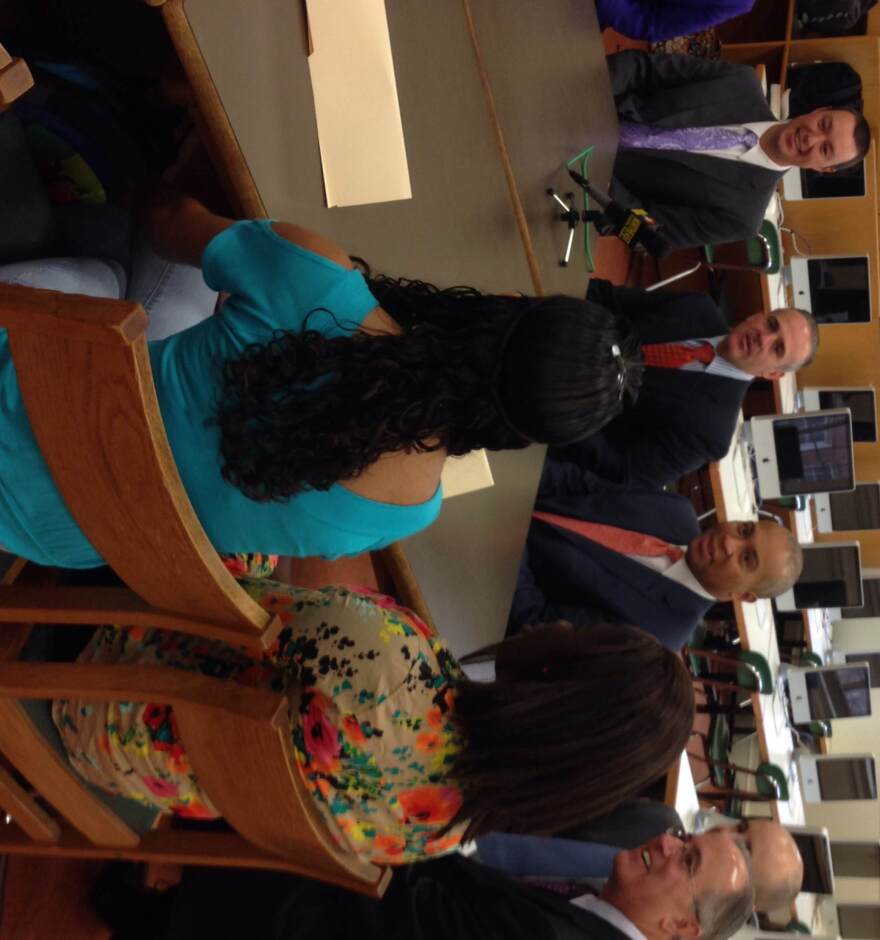Massachusetts Governor Deval Patrick and the state’s Secretary of Education heard concerns from about 15 Pittsfield High School students today.
The high school band welcomed Governor Patrick as he walked up the steps of the school for the town hall style meeting today. One of the major themes was the pressure today’s students feel. Jacob McNally, a senior at PHS, says applying for college is like an additional class on top of his normal school load, football and a job.
“I’m getting maybe four or five hours of sleep and going to school the next day,” McNally said. “I’m finding it hard to do.”
Governor Patrick says he understands time management can be a struggle, but reminded students their days will be even busier when they enter the workforce. Touting the state’s high achievement scores, Patrick reiterated his support for even longer school days and a longer school year as he has in the past. Senior Christine Ahouse is originally from Ghana. She says the school has taken steps to address cultural recognition, but there is still work that remains.
“Trying to fit in, not looking the same as everybody else makes it hard and not being academically leveled with everybody else,” Ahouse said. “So I feel like students who come from different countries should have someone who monitors them.”
Secretary Malone suggested creating an academic support center at the school.
“Environments in our schools where they can talk about and be able to stress-manage,” Malone said. “Sometimes we as adults forget what it’s like to be 16 years old.”
$4.3 billion of Patrick’s $33.6 billion 2014 fiscal budget is designated for investments in education, including $97 million to public universities and colleges. The governor spoke candidly about his experience attending a private school coming from a family supported by welfare.
“So the first day of class all the other boys are putting on their blue blazers and their tweed coats; I have my windbreaker,” Patrick said. “I’m fourteen and I’m humiliated. But, I figured it out."
The governor recalled telling his family the news that he was accepted into college.
"I said ‘Grandma, I’m going to college next year, I’m going to Harvard," Patrick recalled. "And she said. ‘Oh, I’m so proud of you.’ And she was carrying on, yelling and screaming. Then she paused and she said ‘Now where is that anyway?’ And you know what, at that moment I felt devastated, but over time I began to realize what she was excited about wasn’t the prestige, it was the opportunity.”
Patrick and Malone also addressed the current situation at Westfield State University. The state’s Higher Education Commissioner Richard Freeland froze $197,000 in university funding and recommended withholding another $2 million for a planned science center. This comes as the university’s faculty is planning a no-confidence vote on October 16 after college President Evan Dobelle, a former mayor of Pittsfield, missed a deadline Thursday to explain travel spending criticized by an outside auditor and state inspector general.
“I’m not interested and Commissioner Freeland isn’t interested in freezing anybody’s funds for the sake of freezing funds,” Patrick said. “These are very, very serious concerns that have been raised about the spending of the president at Westfield State, who has otherwise done some very good things at Westfield State, but it’s more and more apparent that he is not taking these concerns seriously, and they are serious and need to be and will be taken seriously.”
Malone says he agrees with the decision to freeze funds.
“He’s forced us into this position,” Malone said. “We are not punishing the students. These are capital dollars for buildings; they aren’t student aid dollars. And until the president responds in a serious manner these funds will be withheld.”
Malone also addressed concerns over federal funding being cut from early education programs. While the state’s 2014 fiscal budget increased funding for early education by $15 million dollars, federal sequestration cuts have eliminated $1.7 billion nationwide for programs like Head Start.
“We’re starting to talk to folks about how we can bridge a gap and we’ll see what the answer is,” he said. “Quite frankly, the longer this shutdown lasts the worse it's going to be.”





